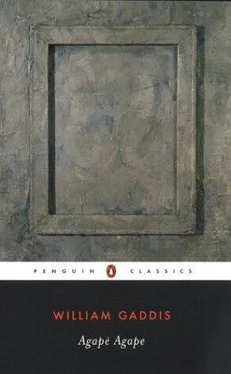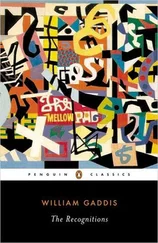William Gaddis
Agape Agape
Separating a writer from his work is difficult under any circumstances. With a novelist as personally reticent and artistically challenging as William Gaddis, it’s almost impossible. There is no purchase. Legend and hearsay move into the crevices usually saved for biography. And how readily the man recedes into an image — a grainy mug shot, perhaps, as befits one so mysterious and threatening. After Thomas Pynchon, he is the most elusive of our masters, more a literary cipher than a known voice.
The Gaddis of my fantasies exerts a powerful and shadowy appeal: the gaunt figure with his frayed patrician-cum-Jack Palance looks; an updated Ahab in doomed assault on that most persistent of chimeras, the great American novel. Call it romantic twaddle, but these imaginings play no small part in the manufacture of reputations, and Gaddis’ is all the more charged for his being so enigmatic.
I’m not sure, though, that reading the novels dispels the mystique so much as changes it, grafting upon the image of the charismatic loner that of the ambitious maker, the artist who would draw his compass line around the vast theme-a-turgy of contemporary American life. Indeed, from his first book, The Recognitions (1955), his monumental cosmopolitan epic of forgery and fate, to JR (1975), his utterly sui generis voice-portrait of American enterprise, to his more accessible recent novels, Carpenter’s Gothic (1985) and A Frolic of His Own (1994), Gaddis declared himself unapologetically serious, a man on the way to the big synthesis.
Gaddis’ enterprise was not so much a search for themes as a search for ways to weave into some strong textile all the features and elements that shape our experience — political, economic, artistic, erotic, etc. Living writers who share this aspiration — and who have certainly drawn courage from his example — include William Gass, Thomas Pynchon, Don DeLillo, Joseph McElroy, Rick Moody, Jonathan Franzen, Maureen Howard, David Foster Wallace, Richard Powers, and Cynthia Ozick. The fact that they are mostly males makes for an unfashionable list in some ways, but it also testifies to a certain machismo impetus behind the maximalist assault on the novel. I don’t know how else to explain it.
There is a certain symbolic aptness in the fact that the novelist who began on such a scale — covering continents and decades with his populous plots and conspiracies — should end, as many do who live long enough, carved back to essential bone and sinew. Not “sans teeth,” and not “sans everything,” but very much sans elaboration. Agapē Agape, the unstructured monologue of a man living through his last days, would seem to be the antipodean Gaddis, his minimalist rejoinder to the vast accumulations that preceded it. But as we will see, it is also a continuation of the arc of the work and its fitting terminus.
To get the first orienting exposure to Gaddis’ method, his literary aesthetic, the reader needs only a strong thumb. Fanning through the first four novels, the manual exertion easing somewhat as the bulk thins from the thousand-plus pages of The Recognitions to the merely gargantuan JR, to the more conventionally graspable two works that followed, we are struck by the relentless visual punctuation of the dash, the author’s Joyce-derived way of indicating dialogue, as in this random example from JR:
— What? Oh I. .
— Well what are you doing hiding in the closet
— No I’m looking for some clothes, I just. .
— Why don’t you put the closet light on then. (316)
And it goes on this way for pages at a stretch.
If nothing else, this riffling of pages vividly discloses the extent to which Gaddis centered his narratives around transcriptions of the spoken voice — voices in combat and accord; voices vigorously staking out airspace, parrying, muscling for attention and advantage. The classic instance of this is JR, quite possibly the most spoken book in our literature, where the characters offer their lines with what can be a frustrating lack of identifying cues, often with nothing more than syncopation and subtle telltale recurrences to help the reader to differentiate between them. I was told by one Gaddis-adept that reading that novel was a swim-or-drown proposition, that to strive for exact coordinates was to court madness; that the only way to hold the sense was by moving forward in great gulps, and trusting the plot to come clear by degrees.
But JR is just the extreme instance. The other three novels each in their way ask that we convert the eye-beam exertion of reading into a highly tuned-up form of listening. And when we do, we can, to crib from our founding bard, “hear America singing.” Except that this singing is really anything but. What we really hear is America cajoling, scheming, grieving, complaining, disputing, lying, seducing, explaining, litigating. . It makes perfect sense that Gaddis was a great admirer of the work of Saul Bellow, in whose pages we likewise quicken to the many strains of the endless and ongoing daily American conversation.
Which brings us, interestingly enough, to Agapē Agape, Gaddis’ thin-yet-crowded, posthumous-yet-intended last novel. Fanning through — the process takes less than six seconds, I timed it — we discover not a single dash in the margins. Fanning again — and one more time for confirmation — we note that there is also not a single paragraph indentation, not even at the very beginning. Doubtless there are other works in the modern canon that proceed thus, but I thought right away of Thomas Bernhard’s Concrete, and the association proved to be the right one — Gaddis in fact meant Agapē Agape to be an homage to Bernhard and, particularly, to that work.
Before turning to Gaddis’ novel, though, I would linger for a moment on this one peculiarity of presentation, the fact that with this unfenestrated brickwork of prose — his last work — the author effects a complete reversal of the narrative ambition of The Recognitions, his first. Where those pages assembled a cast, a mob, of characters, moving them around in space and in time, this pared-down monologue cuts the anchoring line to the world at large and steps entirely into the vocalized thoughts of a dying man. It tells no story, orchestrates no conflicts except those that the narrator wages in his own embattled psyche — mainly between the given and the desired, the harsh grain of things and the vision of art that might redeem it. Yet paradoxically, where the big novels always seem to telegraph the unstated promise of the world they are rooted in — thus carrying a sense of yet unfilled spaces — Agapē Agape feels full to the brim with the pulsations of its inner life.
It will not do, I think, to consider Agapē Agape as simply the fifth and last of Gaddis’ novels. There is an enormous subjective — psychological and metaphysical — difference between a book written as a book, for itself, as it were, and one written with the author’s apprehension of his own death. The pressure to make it a summa of some kind, a last word, has to be enormous. In Gaddis’ case that pressure dictated both the narrative conception — that these are the thoughts of a dying man — and the style, which is not only swift with the urgency of “last days,” but which palpably maps the jittery shifts of consciousness caused by the prednisone he takes for his cancer. How fitting that Gaddis should have claimed and incorporated Bernhard’s short novel as his shadow text; Concrete, too, surges with a literally mortal velocity, and also rides the prednisone-agitated states of its first-person narrator, Rudolph. But with this one all-important difference: Bernhard’s Rudolph is a device, the stand-in voice of a writer still some years from his own untimely death. Gaddis’ voice, if not point-for-point his own, is yet calculated to be close enough to generate the core tension of the work.
Читать дальше












